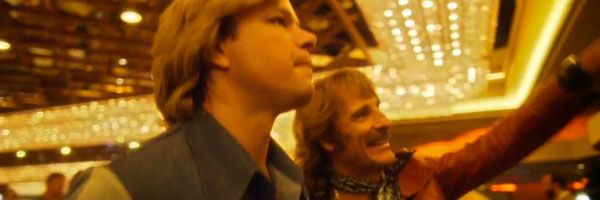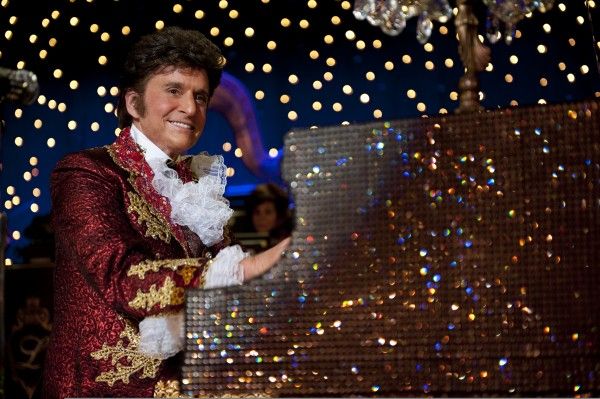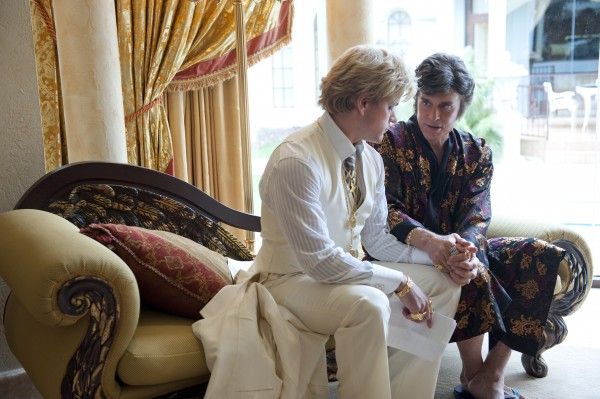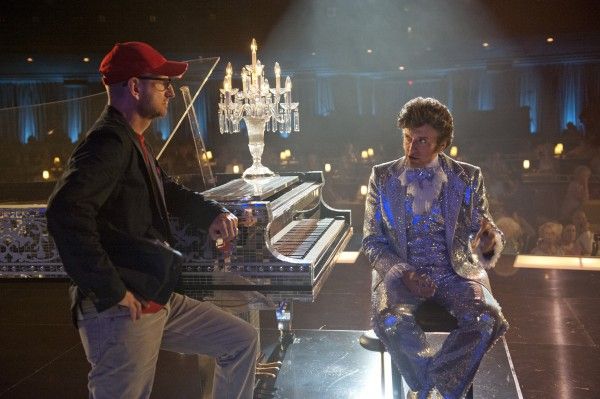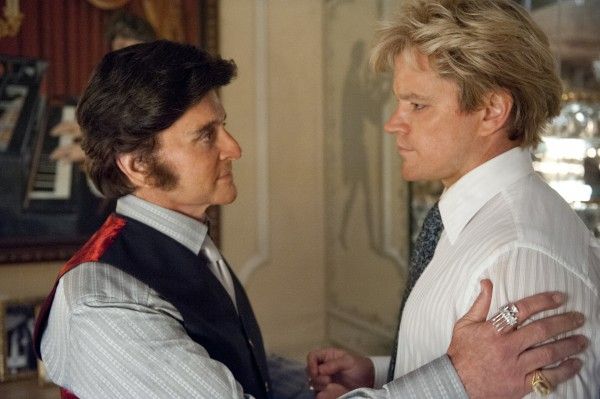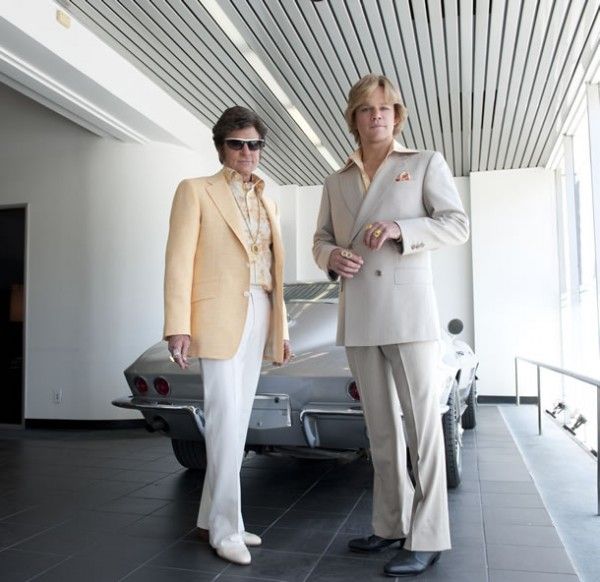From director Steven Soderbergh and screenwriter Richard LaGravenese, Behind the Candelabra (debuting on HBO on May 26th) follows the life of virtuoso pianist and flamboyant entertainer Liberace (in a fantastically impressive performance by Academy Award winner Michael Douglas), while telling the tale of his tumultuous and secretive five-year love affair with the much younger Scott Thorson (in an equally great performance by Matt Damon). The film also stars Dan Aykroyd, Scott Bakula, Rob Lowe, Tom Papa, Paul Reiser and Debbie Reynolds.
During this recent exclusive phone interview with Collider, actor Scott Bakula talked about how he became involved with the project, what he learned about Liberace through his research, how much fun it was to get lost in this character and era, what he loves about working with a filmmaker like Steven Soderbergh, and why the film wasn’t able to get theatrical distribution despite the level of talent involved. He also talked about the musical he’s shooting in India, called Basmati Blues, and his desire to return to the stage. Check out what he had to say after the jump.
Collider: How did you come to be a part of this? Did you just get a phone call because you’d worked with Steven Soderbergh before?
SCOTT BAKULA: Yeah, that’s exactly what happened. I’d done The Informant with the guys, and they called. Greg Jacobs, who I’ve known for a lot of years, produced this with Steven and is really an integral part of every movie that he’s done, called me and said, “Hey, we’re getting ready to do it, and we’ve got this little part in there for you.” I knew they had a Liberace movie in the works because they’d been talking about it for years. He said, “So, I’m just going to send you the script and let me know if you like it.” And I said, “Greg, I’ll do it!” He said, “No, read the script, and then call me back.” So, I called him back and said, “Okay, I read the script and I’ll still do it!” It’s such a joy to work with them, and I had a great relationship with Matt [Damon] that started with The Informant. The longer I’m in this business, the more you cherish the times when you’re working with people that do great work, and can figure out how to enjoy themselves while they’re doing the great work.
If anyone is going to do an unexpected movie about Liberace, it’s Steven Soderbergh, wouldn’t you agree?
BAKULA: Exactly! And there’s a certain trust factor that goes into that. You know that something artistic is going to come out of it, and it’s important to be a part of that. I support what the movie is about. Yes, it’s a biopic, but the events in Liberace’s life and how he chose to live and the onset of the HIV/AIDS crisis is very important and very relevant today, obviously. It’s always great to be involved in something that’s not in an in-your-face fashion, but has a message that goes out guised as entertainment. And Michael [Douglas] did such a great job. I was blown away by his performance.
The film does a great job of finding that level of flamboyancy that you want, but never gets too campy.
BAKULA: Liberace was a miracle. You talk about who he was and what he did, and then you look at who he inspired, from Elton John to Cher to Michael Jackson to Bette Midler. There are so many people that came to see him. Elvis was there, watching his shows. That kind of showmanship was something he fathered, really, under this completely straight, heterosexual character that we all look back on and say, “Are you kidding me? There was one person in the audience that didn’t know that he was gay?” But no, it was the entire audience. They wouldn’t even have it. He sued anybody who ever said he was gay, and he fought to hide that. He went to such lengths to cover that up because he felt convinced that, if word got out, he would lose his empire, his business, his income and his fans. Whether that would have happened or not, I don’t know. We’ll never know. But, he felt that strongly about it, and perpetuated his secret. I think it’s hard to relate to, unless you’re somebody who’s living with a secret and can understand the fear of being completely honest with the people that know you and employ you. Lots of people still live with fears about anything. It can be lots of different things. One of the hardest things to do is to be present and open and clear about who you are and what you stand for. We all have issues with that. Certainly with the way he was raised and where he was raised, it did not open the door. It wouldn’t have been conducive. Had he been born in a different city or to different parents, who knows who he could have been or what he would have done. But as it turned out, his fate was to appear to the world in the way that he did. We’re learning from him, posthumously, as they say.
Prior to this film, did you know much about Liberace, as a man and a musician?
BAKULA: No. I was very aware of his performances when I was growing up. I saw him on The Tonight Show and on specials, and when he would show up in all the ways that he did. But, I grew up in the Midwest, in St. Louis, and there were no conversations being had about homosexuality, at all, unless you were in that community, and my family was not. So, I didn’t have a clue about that. I wasn’t connected to the idea of people being gay, when I was growing up. There was no question that he was just out there. He was Barnum & Bailey. He was the circus, at the piano. He found his way to get attention and make money at it, and we bought that. He played the piano great. A couple years ago, I worked with Frank Oz, as a director. At the time, his memory of Liberace was from being underneath the piano on The Ed Sullivan Show. He said, “I don’t remember if I was working Miss Piggy or Fozzie Bear or whoever, but I remember that all I saw were his legs and his fingers, playing the piano.”
Was there any particular research that you did to find this character?
BAKULA: I read the book, first and foremost. As soon as the guys talked to me about being in the movie, I found the book and read it. And then, I delved into a bunch of old Liberace videos. I did lots of research about the period, in terms of wardrobe. We had a great time figuring out what we wanted the guy to look like. He’s a choreographer, and I know lots of folks in the dance world and lots of gay choreographers. I wasn’t trying to be Fosse, or a known choreographer. I just accumulated lots of bits and pieces of information. Although we weren’t technically basing this on a real character, this character did exist, just not with this name. There wasn’t somebody I could go to and base it on. It’s not like it’s a huge part in the movie, so you try to get the flavor of the times and a certain attitude that works, and then deliver the character that’s on the page, with everybody else, working on all these scenes. I had a lot of scene work with other people, and Matt and I already knew each other, so we had a ball.
As actors, was it fun to really get lost in these characters?
BAKULA: The reason why most of us got into acting was so that we could become other people and have fun with being somebody else. So, when you get into any kind of period work, or any kind of prosthetic work, or anything that alters what your 8x10 looks like, it’s the joy of escaping and becoming somebody else. And it is definitely freeing. To be quite honest, I find that it’s easier to do parts that are wrapped up in different hair and wardrobe and eras, and different period behavior, than it is to play closer to the present. I have great appreciation for people that are out there playing shades of themselves, almost, because you don’t have anywhere to hide. You have to be very honest and truthful and clear about it because you’re not hiding behind fake stuff.
What is Steven Soderbergh like to work with, as a director and collaborator? Having worked with him previously, has he changed as a filmmaker, at all, or is he exactly the same filmmaker he was?
BAKULA: What I love about Steven is that he’s extremely bright and he’s extremely creative, and he is always thinking and creating, but he never makes a big deal about it. If you didn’t know who he was, you wouldn’t know who he was because he’s just not about that. He’s into creating these images and these moments and this collection of stories, in a way that he has a vision for how they all go together. It’s not at all about how he gets there, or who helps him get there. He’s completely collaborative, in that sense, and I so appreciate that about him.
You have all different kinds of directors. Steven spends a lot of time thinking about who he’s going to cast. Very seldom do you see a Soderbergh movie – and he has the luxury of this, in my opinion – where he’s been forced to cast someone that’s really not right, but the studio insisted or the network insisted. If you look at the bulk of his work, he’s discovered people, and he’s brought people in that you think you know, but that do something different. Part of his skill is that, if you get the right people and have them do the right things, his work becomes simpler, in a way. He doesn’t have to do as much directing.
His adjustments are always subtle and simple, and sometimes very direct. He’ll just say, “No, that didn’t work.” And he’s very self-deprecating. He’s always clearly in charge of everybody and everything, and he lets everybody else feel like they’re running the show. It’s hard to describe. He’s just a joy to be around, work with and watch. I’m always fascinated by him. I haven’t been in every frame of the two movies that I’ve done with him, but Steven has these ideas. He doesn’t go around telling everybody, “I have this fabulous idea.” He just does his work.
Are you surprised by the fact that this film was such a tough sell and that it ultimately didn’t get theatrical distribution, especially with the level of talent involved?
BAKULA: Well, I was certainly surprised that it took them as long as it did to get it made. But, as the years go by in this business, and as each month and day go by, I’m less and less surprised that it didn’t get a theatrical release, here in the States. This is very typical of Steven and Greg, but they were like, “You know what? More people are going to see the movie in the States because it’s on HBO, then if we released it in a small theatrical release, so we’re really excited about that.” He’s challenging himself, he’s trying to challenge the medium, and he’s trying to challenge the industry to think differently. We all are in his debt for that, I think.
Are you currently working on something now?
BAKULA: I’m actually currently in between India and here. I’m shooting a movie called Basmati Blues, with Brie Larson, Donald Sutherland and Tyne Daly. Everyone else in that are Indian actors. There’s music, and there’s some original music. It’s got a Baz Luhrmann vibe to it. It’s a love story in India, and there’s dancing. It’s almost impossible to describe what it is. But, I was there for three weeks, I’m home for three weeks, and I’m getting on a plane, in a few days, to go back and finish. I’ve got a big number to record, and I’m going to go over there and be a part of that. That’s currently what I am in the middle of. It’s bizarre and quite an experience. That’s all I can tell you.
As an actor, you hope to have one project in your career that people remember, and you’ve had a few. What’s it like to know that you’ve done work that people not only love, but that really sustains over time, and that people will continue to discover and love?
BAKULA: Well, I have to say that’s the good and the bad part of our business and our life. With the advent of cable, it’s gone beyond reruns. When I was growing up, reruns meant that every Easter The Wizard of Oz came on. There weren’t video stores. There weren’t places you could go and get it. There wasn’t the internet, or all of these things. There’s not anywhere on the planet, because of the nature of the kind of work that I’ve done, where people haven’t seen it. That’s daunting, in a way. And it’s not something you can think about, when you’re doing your work. It becomes cumbersome and gets in your way. But, it’s a wonderful feeling.
It’s a joyful, humbling feeling to be in different places around the planet and people have seen shows that I’m proud of being a part of, that do have things to say about the human condition, the planet, and who we are and where we’ve come from, that will sustain. Those ideas are universal and they work in any language. They’re relevant today, and they’ll continue to be relevant until we’ve solved every problem on the planet, which I’m not guessing is going to be next week. It’s not something you start out to do. I didn’t say I was going to be an actor because I wanted to make a difference in the human condition. I wanted to be an actor because it gave me the opportunity to express myself in ways I wasn’t comfortable expressing myself, as a kid growing up in St. Louis. It opened doors for me to explore my emotions as different people and characters, and expand my own inner soul. That it’s led to all these other things is miraculous. And yet, it is great to be a part of it and to be involved.
I’m lucky. Unless you just say, “Hey, I want to be a famous person, and this acting looks like it’s easy, so I’m going to go be an actor,” you fall in love with your high school production or your Summer Stock production of whatever it is. In my case, it was singing in a show when I was in seventh grade. It was something magical that I just didn’t have a clue could make you feel that way. I never intended to be on television or in a movie. The theater was all I ever dreamed about, once I decided to try to make it as a business profession. All this other stuff has just been icing.
Do you see yourself returning to the stage again soon?
BAKULA: Yeah, I try to get on stage whenever I can. I did a play in London, a couple years ago. I’ve done musicals more recently, at the Hollywood Bowl. I’m always trying to be involved in the theater, doing something on stage, whenever I have downtime. I’m always looking for it.
Behind the Candelabra debuts on HBO on May 26th.

